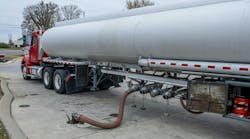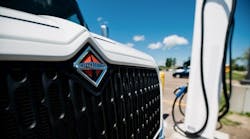Ford Motor Co. research into the use of fuel cell propulsion systems – fueled by hydrogen gas – to power a range of vehicles finds that technology withstands real-world usage far better than expected.
As a result, Ford is extending its three-year-old hydrogen fuel cell program for up to 24 months in cooperation with the Department of Energy (DOE) after the company found its first generation fuel cell equipped Focus sedans lasted three times longer and worked much better than originally expected with virtually no degradation in performance. The company said its 30 fuel cell test vehicles have accumulated 865,000 real-world mi. and earned high marks from various fleet users around the world.
“We’ve had a lot of great experience with these cars and they’re running quite well,” noted Scott Staley, Ford hybrid and fuel cell development chief engineer in North America. “We expected the fuel cells to be much more problematic under real world conditions, but it’s a credit to our development process that the vehicles have been very robust.”
Staley added that the vehicles are proving highly reliable, averaging 96% up time, while customer surveys indicate that Ford’s fuel cell vehicles have outperformed those of other automakers in areas of acceleration, comfort (primarily air conditioning performance), durability, reliability and mileage.
In light of that success, the DOE – which shares the program’s operating cost with Ford – said it agreed to extend the program until its next generation fuel cell system is ready for deployment in the 2010 timeframe. Those systems should feature major improvements over current units, added Chris Gearhart, Ford’s fuel cell technical specialist, as the company expects next generation technology to significantly increase fuel cell life, improve mileage, use platinum (a key catalyst) more efficiently, create more power from a smaller fuel cell stack, improve reliability and the ability to start under frozen conditions.
These test results are critical, said Ford, because fuel cells can be adapted to a wide range of vehicles – including commercial models, such as transit buses. Fuel cell vehicles produce electricity through an electro-chemical process in the fuel cell stack using hydrogen gas with zero tailpipe emissions – only drops of water come from the exhaust, Ford said.
The company began working with its first fuel cell prototype in 2003 and began its current full-fledged light vehicle test program in 2005, testing fuel cell equipped Focus sedans with a variety of government agencies in California, Florida, Michigan, Canada, Germany and Iceland, where cold climate testing is expected to result in significant performance improvements on the next generation.
Additional Ford hydrogen projects include a fleet of 20 H2ICE (hydrogen internal combustion engine) shuttle buses, a mid-sized Fusion sedan and fuel cell-powered Explorer sport utility vehicle.




